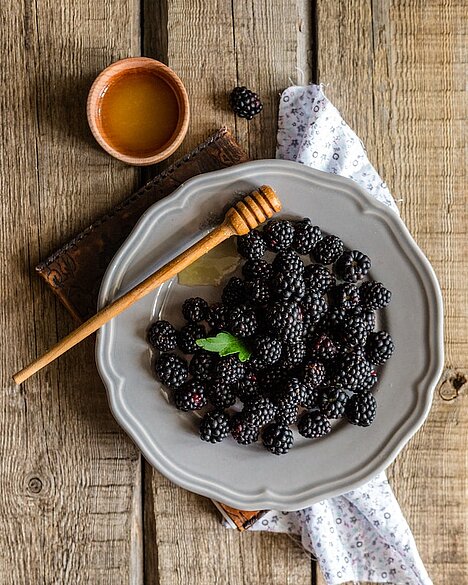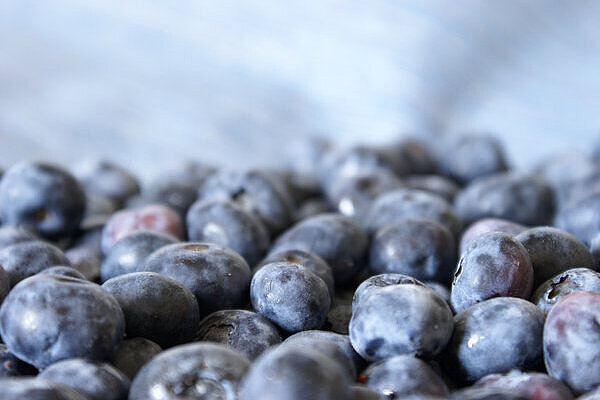Blackberries

What are blackberries?
Blackberries are berry fruits that belong to the rose family. They grow on thorny bushes, which can often be found on forest edges, hedges or fences. The fruits are black or dark purple when ripe and consist of many small drupes hanging from a stone. Blackberries have a sweet and sour taste and are rich in vitamins, minerals, fiber and antioxidants.
What are the benefits of blackberries for dogs?
Blackberries are healthy for dogs because they contain numerous vitamins and nutrients. Particularly noteworthy is their high vitamin C content, which can strengthen the immune system and ward off pathogens. Blackberries are also high in antioxidants, which protect against free radicals and can prevent cell damage. Blackberries are also a good source of fiber, which can aid digestion and regulate blood sugar levels. Blackberries can also have an anti-inflammatory and antibacterial effect and help with diarrhea. Last but not least, blackberries are low in calories and sugar, so they do not pose a risk of obesity or tooth decay.
What are the disadvantages of blackberries for dogs?
Blackberries are safe for dogs as long as they are fed in moderation. However, too many blackberries can lead to gastrointestinal problems, flatulence or diarrhea. In addition, the small seeds in blackberries can become a problem if they are not chewed well. They can damage the teeth or, in the worst case, lead to an intestinal blockage. Therefore, you should only give your dog ripe and soft blackberries and make sure that he chews them well. Blackberries are also not suitable for all dogs. Some dogs don't like the taste or texture, others may have an allergic reaction. You should therefore only give your dog a small amount at first and observe how he tolerates it.
How do you feed blackberries to dogs?
You can give your dog blackberries as fresh or dried fruit. You can also puree them or make them into a smoothie or ice cream. Blackberries are good as a snack between meals or as a reward during training. However, you should make sure that you don't give your dog too many blackberries.
As a rule of thumb, you should not give your dog more than two blackberries per kilogram of body weight per day. So for a small dog, two blackberries a day are sufficient, a medium-sized dog can have four or five a day, and a large dog six to eight.
Blackberries are therefore a healthy and tasty treat for dogs that you can feed in various forms. Blackberries can be used as a snack between meals or as a reward during training. You can also use them as a topping or addition to BARF meals. Blackberries are versatile and tasty as long as you give them in moderation and pay attention to quality.
What should you look out for when buying and storing blackberries?
When buying blackberries for your dog, you should pay attention to a few things.
- Firstly, you should only choose ripe and soft blackberries that have no signs of mold or rot.
- Secondly, you should make sure that the blackberries are not sprayed or sweetened. Organic blackberries or blackberries from your own garden are best.
- If you pick blackberries in the wild, you should make sure that they do not grow on a busy road or near waste or manure.
- You should also wash the blackberries thoroughly before feeding them to remove dirt and pests. Blackberries are very delicate and spoil quickly.
- You should therefore store them in the fridge and consume them within two to three days.
- If you want to preserve blackberries for longer, you can freeze or dry them.
- You can store frozen blackberries in the freezer for up to a year and dried blackberries in an airtight container for up to six months.
Blackberries are a healthy and tasty treat for dogs that you can feed in various forms. They contain lots of vitamins, minerals, fiber and antioxidants that can boost the immune system, aid digestion and protect against cell damage.
Blackberries can also have anti-inflammatory and antibacterial effects and help with diarrhea. Blackberries are safe for dogs as long as you give them in moderation and pay attention to the quality.
Too many blackberries can lead to gastrointestinal problems, flatulence or diarrhea. In addition, the small seeds in the blackberries can become a problem if they are not chewed well. Therefore, you should only give your dog ripe and soft blackberries and make sure that he chews them well.
Properties 6
Are you looking for other ingredients with a specific property?
Just click on them to find more.
If you notice any signs of hypersensitivity or poisoning in your dog, you should see your vet immediately. We are not a substitute for a vet, but we try to be as accurate as possible. Every dog reacts differently and we recommend you get a second opinion or consult your vet if in doubt.
Stay healthy and take good care of your four-legged friend!😊
Similar to Blackberries
Strawberries are not real berries, but aggregate fruits. This means that the small yellow seeds on the red surface are the actual fruits, which are surrounded by a fleshy receptacle. Strawberries...
Raspberries are berry fruits that belong to the rose family. They grow on bushes that can grow up to two meters high. The fruits consist of many small individual fruits, which together have a...
Blueberries (Vaccinium myrtillus) are small, round berries with a blue to purple color. They grow on deciduous dwarf shrubs that belong to the heather family (Ericaceae). Bilberries are native to...
Currants are the only genus in the gooseberry family. There are different types of currants, which differ in color, taste and nutritional content. The best known are the red, white and black...



